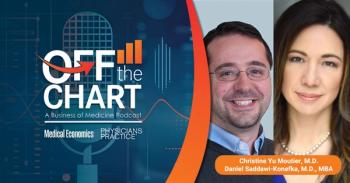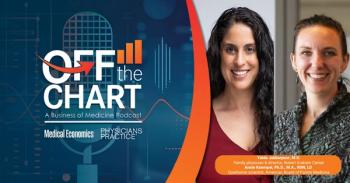
'My Scariest Experience as a Doctor'
Infectious disease specialist Onyema Ogbuagu's quiet walk was interrupted by an unexpected delivery.
It was 2 a.m., early Sunday morning. I was the only physician in-house and on call for a busy OB/GYN division; completing a long, three-day weekend call. I had chosen to do a yearlong internship at a rural community hospital in Nigeria. As a junior house officer (intern) rotating in a busy labor and delivery room, I was responsible for overseeing and instructing experienced nurses who, honestly, both in age and experience, surpassed my own years of life.
I was also responsible for managing a few women at different stages of labor - monitoring their uterine contractions and plotting manual partographs - who, by their collective expressions, belied the fact that a joyful event was ahead. For some, by necessity, I had ordered an augmentation of labor, which I understand can be quite intense and painful. Everything had gone smoothly and my patients were stable.
I had a few minutes to spare. So, I left the "madness" for a much desired break, or so I thought. I strayed from the old, single-story hospital to enjoy the cool breeze, gaze at the stars, which in a few hours would be obscured by the sun, and hopefully recuperate. I dreamed of a better quality of life after a rigorous internship, willing myself to recharge and regain my usual pleasant temperament for the rest of my shift, which had been wearied away by long work hours.
I strayed far along a dirt and pebble-ridden road which marked the entrance to the hospital, hoping not to be disturbed. I was alone, relaxed, and loving it. By choosing this quintessentially rural Nigerian hospital, I was able to enjoy a different sort of experience than I would at a busy urban center. I breathed in the night air, feeling tranquil and at peace for a few moments - at least so I imagined.
My quiet pondering was suddenly shattered by a single headlight, shining like a beacon in the darkness. It was headed toward me. I thought, "This must be a car with one lost headlight." However, its reverberating and characteristic sound soon persuaded me otherwise. It was a motorcycle, bumping up and down on the uneven, unpaved road.
As it approached, I was blinded by the light. However, once it came even closer, I could make out the figures of two people: a man and a woman. The woman seemed uncomfortable, in some sort of distress, and soon I understood why - she was pregnant and in labor. "Not so bad," I thought. "She is probably in early stages of labor and they need directions to the labor room. I will show them the way."
I was wrong. The driver stopped once he saw me: I was male and in scrubs, I must be a doctor. He helped the woman off the motorcycle and she stood quivering and grunting in pain in front of me, muttered breathlessly to me in our mutual native language that she had a sudden urge to bear down and deliver her baby.
"Are you kidding?" I said. I continued, "Not now, not here, not me!"
She apparently did not hear me, or if so, was not persuaded. The clay road below was hardly a desired birthplace, I had no "tools of the trade" - cord clamps, scissors, nasal aspirators or receiving blankets - to work with, and no trained assistants available. Time froze.
I honestly don't remember much afterwards except that somehow the baby was now on the road covered in dirt and pebbles. He was crying at the top of his lungs, probably saying in "Babynese" "Rescue me!" His mother lay on the ground exhausted. The combination of the labor-propelled bumpy ride and sudden birth had taken a toll on her. She lay bleeding on the street. Her transporter, not much better himself, was frozen in astonishment, staring open mouthed, and gazing at me expectantly as if saying, "You are the doctor, do something!"
I was confused, scared, and shaken all at once. A second passed, maybe it was a minute or probably a duration that I'll never know. Who needed my help the most? The helpless baby, welcomed to the world in the worst circumstance possible and covered in dirt and pebbles; its mother, laying exhausted and bleeding on the street; or her male companion who was an unwitting participant in this unforeseen and traumatizing event.
My instincts, medical training, and common sense all kicked in at once, thankfully. I asked the driver to get me some help from the labor and delivery and to convey news of the stupefying event, while I cuddled the slippery baby in my trembling arms trying to warm it with my body, pinching his cord between my fingers. At the same time I spoke words of comfort to his mother assuring her that assistance was on its way. After what seemed like an eternity, help arrived. I cut the cord and took the baby to clean and warm him, leaving the woman with experienced nurses to stabilize her.
The next day, I visited mother and baby on morning rounds - both healthy. "Baby Pebbles," as I called him, was clinging to his mother's breast, enjoying nature's free provision of liquid nutrition. Later, they were discharged in healthy condition. I wonder if he'll ever be told the truth about the circumstances of his birth.
After the event, I was relieved and somewhat traumatized at the same time. This was the best possible outcome, but the situation could easily have turned out worse. I wondered if my desire to take a walk at that time was a divine nudging or simply mere coincidence. I like to think it was the former. I also had learned an important lesson, well known to experienced physicians of all specialties, that I should, when on call, as they say, always expect the unexpected.
I shared my experience with my friends and colleagues afterwards. They thought I was a hero - at least for a day! However, I continue to hope that such an experience will remain a "once in a lifetime" event.
Onyema Ogbuagu, MD, is currently a fellow in infectious diseases at Yale School of Medicine. He was born in Philadelphia, but left for Nigeria at an early age, where he lived till the completion of his medical training. He is married and has three children.
This article originally appeared in the June 2011 issue of Physicians Practice.
Newsletter
Optimize your practice with the Physicians Practice newsletter, offering management pearls, leadership tips, and business strategies tailored for practice administrators and physicians of any specialty.









